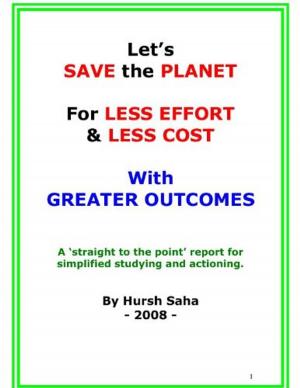Why is NZ behind in its practice of triple bottom line reporting compared to other Western nations?
Business & Finance, Accounting, Economics| Author: | Hursh Saha | ISBN: | 1230000284195 |
| Publisher: | Hursh Saha | Publication: | October 1, 2006 |
| Imprint: | Language: | English |
| Author: | Hursh Saha |
| ISBN: | 1230000284195 |
| Publisher: | Hursh Saha |
| Publication: | October 1, 2006 |
| Imprint: | |
| Language: | English |
Accounting Honours University Essay
Triple bottom line reporting (TBLR) is no longer just seen in magazine articles or
university textbooks. It is there in practice throughout the Western world.
However, New Zealand appears to be behind in its practice of it. Why is this?
The purpose of this paper is to provide a logical answer to this question and also
contribute further analysis into the subject area. Therefore, the research of the
paper is secondary in nature. The paper is structured by first providing a general
background on TBLR. Secondly, there is a description of where NZ stands in its
current practice of TBLR compared to that of other major Western nations,
showing that it is behind. Thirdly, there is an analysis of why this is the case
which includes statements from famous academics on how ‘effective’ TBLR has
really been in the past. This section includes the author’s opinion on what should
be done, on a national and global scale, to improve TBLR and link it with ethical
conduct. A conclusion then closes the paper.
Accounting Honours University Essay
Triple bottom line reporting (TBLR) is no longer just seen in magazine articles or
university textbooks. It is there in practice throughout the Western world.
However, New Zealand appears to be behind in its practice of it. Why is this?
The purpose of this paper is to provide a logical answer to this question and also
contribute further analysis into the subject area. Therefore, the research of the
paper is secondary in nature. The paper is structured by first providing a general
background on TBLR. Secondly, there is a description of where NZ stands in its
current practice of TBLR compared to that of other major Western nations,
showing that it is behind. Thirdly, there is an analysis of why this is the case
which includes statements from famous academics on how ‘effective’ TBLR has
really been in the past. This section includes the author’s opinion on what should
be done, on a national and global scale, to improve TBLR and link it with ethical
conduct. A conclusion then closes the paper.















